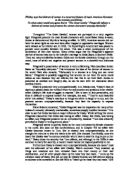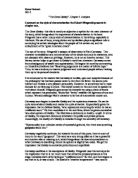Daisy is presented very unsympathetically. Ann Massa cites, “Daisy’s lack of depth and passion leads her to flinch from the real emotion and profound inner vitality which Gatsby’s life style struggles to express.” She is seen to lack personality, and finds it difficult to express herself. For example, she said, “’They’re such beautiful shirts’ she sobbed.” Daisy’s reactions to things are either to laugh or to cry, and this presents women unsympathetically, because they lack the capacity to express themselves.
Diane Roberts remarked, “Zelda Fitzgerald was the inspiration for many of her husband’s amoral, ultimately unattainable, sometimes deeply troubled heroines.” It is clear to see that Zelda has been a major influence for Daisy. While writing this novel, Fitzgerald discovered that Zelda was having an affair. Daisy, like Zelda, was having an affair, and Fitzgerald presents her as untrustworthy, because “Tom was evidently perturbed at Daisy’s running around alone.”
Fitzgerald seems to portray Daisy as the most untrustworthy female character in the novel. She does not like confrontations, and in Chapter VII her affair with Gatsby becomes known to Tom. She is viewed here unsympathetically, as she changes her mind as to who she wants to be with. She chooses Tom finally, once she heard that Gatsby was “a common swindler who’d have to steal the ring he put on her hand.” Daisy chose the security that Tom offered, and although in the 1920s it was common to marry for security, a modern reader would not respond positively to her.
Furthermore Daisy is viewed very unsympathetically, because she doesn’t deal with the aftermath of her affair with Gatsby. Nick’s comment “they smashed up things and creatures and then retreated back into their money or their vast carelessness…and let other people clean up the mess they had made…” sums up this criticism made of Daisy. She did not stay for Gatsby funeral, and left without leaving an address to be contacted at. She left Nick to “clean up the mess they had made.” She also says to Gatsby, “I’d like to get you in one of those pink clouds and put you in it and push you around.” This suggests that she wants to escape with Gatsby, without letting Tom find out. Daisy’s inability to take responsibility for her actions leads to the mistrust Fitzgerald has been reflecting throughout the novel.
Myrtle Wilson can be viewed unsympathetically. She is having an affair with Tom, and has hopes of leaving Wilson. She can be viewed unsympathetically, because she seems able to use any means possible to get on the world, including sleeping with another man. This could symbolise Fitzgerald’s criticism of the “American Dream” gone wrong in the novel. Fitzgerald reflects distrust in women, because Wilson said, “I told her she might fool me, but she won’t fool God.” We don’t feel sympathy for Myrtle, because there is a sense that Wilson had no reason to doubt or mistrust her. This makes this revelation all the more shocking for him, and the fact that he becomes very sick when he found out emphasises how unexpected this affair was, and how a reader would find it difficult to sympathise with Myrtle. She also tries to dispel how she once felt for Wilson, by saying, “I was never any more crazy about him than I was about that man there.” Along with Daisy, Myrtle tries to dismiss romantic feelings she once had. Fitzgerald uses the way these women so flippantly change their mind to reflect the distrust of women, who it seems, when in certain company, give inconsistent answers.
However, Fitzgerald does not just portray women as untrustworthy characters. We do feel sympathy throughout the novel for Myrtle. She is married to a man she doesn’t love, and her failure to recognise that Tom sees her no more than a mistress presents a very tragic way of life. She has told elaborate stories to her sister, Catherine, about why Tom can’t get divorced. These include, “She’s a Catholic and they don’t believe in divorce.” Myrtle’s inability to see that she will never marry Tom creates a lot of sympathy for her.
Sympathy is also created for Daisy, because of the nature of her marriage. Tom is described as a “brute of a man.” He also seems very pompous and demanding. Daisy is in an oppressive marriage, which is best summed up by the quotation, “Then there was a boom as Tom Buchanan shut the rear windows…and the two young women ballooned slowly to the floor.” This suggests that Daisy is trapped in this house, and could also symbolise Daisy being trapped in the marriage. The distrust of Daisy could be linked to her fear of Tom, and we feel more sympathy for her.
Fitzgerald creates sympathy for women because he presents Daisy as understanding her position in the world. On the birth of her daughter, she remarks, “I hope she is a little fool. That’s the best thing a girl can be in this world, a beautiful little fool.” Daisy is presenting her boredom with life, and suggests a girl can have fun if she is attractive, yet simplistic. This creates sympathy for women, because Fitzgerald understands their position and lack of power.
Jordan Baker has sympathy created for her. In some ways, Jordan is an anachronism for women at this time. She symbolises the new wave of women emerging in the twenties. Jordan is hard working and self sufficient, she has a masculine name, and also she is described as having an “athletic and boyish” figure. Sympathy is created for Jordan, because she doesn’t quite fit in with this era of women.
In conclusion, to a very large extent I agree that Fitzgerald reflects a distrust of women. Many argue that this is due to his turbulent marriage with Zelda. Fitzgerald has indirectly blamed two major female characters for the death of the “Great Gatsby” that being Myrtle and Daisy. He has portrayed female characters in a deplorable way throughout the novel. However, it can be noted that the depiction of female characters isn’t completely negative. Fitzgerald is able to instil readers of the somewhat harsh realities of life for women in the 1920s, and he is able to capture the restless, materialistic and defiant atmosphere of the post-war era.
Bibliography
English Review, Scott Fitzgerald and the Jazz Age, Diane Roberts
American Literature in Context 1900-1930, Ann Massa







